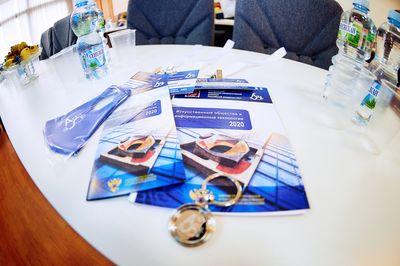ИИ-инструмент для автоматизации отладки и поиска багов в коде
International conference "Artificial Societies and Information Technologies"

Conference "Artificial Societies and Information Technologies"

Конференция "ИСКУССТВЕННЫЙ ИНТЕЛЛЕКТ В НОВОЙ КОММУНИКАТИВНОЙ РЕАЛЬНОСТИ"
“Artificial Societies” included in the list of the Higher Attestation Commission [CLONE]
On March 26, 2019, the electronic scientific journal “Artificial Societies” (artsoc.jes.su) entered the Higher Attestation Commission List — a list of leading peer-reviewed scientific journals where the Higher Attestation Commission of Russia recommends to publish the main scientific results of the thesis for the candidate and doctor of science degrees.
The idea of creating an electronic academic journal devoted to researches in the field of agent-based computer models (ABM) emerged in 2006 as part of the activity of the Agent Modeling Laboratory of the Central Economic Mathematical Institute of the Russian Academy of Sciences (RAS). The chief editor of the journal is Valery Makarov, the Academician of the RAS. In 2016, with the support of the State Academic University of the Humanities (GAUGN), the journal was transferred to the new technological platform JES (Journal of Education and Science), which meets modern standards in the field of scientific periodicals in the best way.
Today, the scientific journal “Artificial Societies” provides twenty-four-hour access for readers — scientists, teachers, students — to publications in a wide variety of scientific fields related to the digitalization of the economy, multi-agent modeling in the natural and human sciences and the development of an artificial intelligence. The high scientific level of the work on reviewing and preparing materials published in the journal is assured by the team of the Central Economic Mathematical Institute of the Russian Academy of Sciences.
The Editorial invites authors to publish their articles!
“Artificial Societies” included in the list of the Higher Attestation Commission

On March 26, 2019, the electronic scientific journal “Artificial Societies” (artsoc.jes.su) entered the Higher Attestation Commission List — a list of leading peer-reviewed scientific journals where the Higher Attestation Commission of Russia recommends to publish the main scientific results of the thesis for the candidate and doctor of science degrees.
The idea of creating an electronic academic journal devoted to researches in the field of agent-based computer models (ABM) emerged in 2006 as part of the activity of the Agent Modeling Laboratory of the Central Economic Mathematical Institute of the Russian Academy of Sciences (RAS). The chief editor of the journal is Valery Makarov, the Academician of the RAS. In 2016, with the support of the State Academic University of the Humanities (GAUGN), the journal was transferred to the new technological platform JES (Journal of Education and Science), which meets modern standards in the field of scientific periodicals in the best way.
Today, the scientific journal “Artificial Societies” provides twenty-four-hour access for readers — scientists, teachers, students — to publications in a wide variety of scientific fields related to the digitalization of the economy, multi-agent modeling in the natural and human sciences and the development of an artificial intelligence. The high scientific level of the work on reviewing and preparing materials published in the journal is assured by the team of the Central Economic Mathematical Institute of the Russian Academy of Sciences.
The Editorial invites authors to publish their articles!
Advanced Training “Philosophy of Artificial Intelligence”
The program accepts persons with a completed higher education of any profile. The program is designed for teachers of secondary and higher educational institutions, as well as researchers specializing in social studies, philosophy, computer science, information technology and psychology; engineers and technologists whose professional activities are related to the modeling, use and analysis of complex intelligent systems. More information here >>>
Журнал «Искусственные Общества» включен в базу данных Ulrich’s
Дорогие авторы и читатели журнала!
Редакция продолжает активную работу по продвижению журнала «Искусственные Общества» в мировые индексы и базы цитирования. Рады сообщить Вам, что теперь журнал включен в базу данных Ulrich’s Periodicals Directory.
Выпуск 12, номер 3-4
В выпуске представлена статья Акопова А.С., Бекларян Г.Л., Бекларян Л.А. посвященная моделированию эколого-экономической системы города. Также в работах Гумеровой Г.Т. и Зулькарнай И.З. рассматриваются вопросы моделирования исламской финансовой модели.
